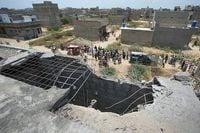On the night of May 7-8, 2025, tensions between India and Pakistan escalated dramatically as Pakistan launched a series of attacks targeting multiple military locations across northern and western India. The Pakistani military attempted to strike at key sites using drones and missiles, including significant targets in Awantipura, Srinagar, Jammu, Pathankot, Amritsar, Kapurthala, Jalandhar, Ludhiana, Adampur, Bhatinda, Chandigarh, Nal, Phalodi, Uttarlai, and Bhuj. However, the Indian Army successfully countered these attacks, employing an Integrated Counter Unmanned Aircraft System (UAS) Grid and advanced Air Defence systems to neutralize the threats before they could cause damage.
The Indian Defence Ministry confirmed that the Pakistani military's attempts were thwarted, stating, "These were neutralised by the Integrated Counter UAS Grid and Air Defence systems. The debris of these attacks is now being recovered from a number of locations that prove the Pakistani attacks." This proactive response reflects India's commitment to safeguarding its national security amid rising tensions.
In retaliation, the Indian Armed Forces targeted and destroyed a key air defence system in Lahore early on May 8. The Defence Ministry's statement highlighted that Indian forces responded to the missile strikes by targeting several air defence radars and systems within Pakistan, effectively demonstrating a strong and measured military response. The ministry noted, "Today morning Indian Armed Forces targeted Air Defence Radars and systems at a number of locations in Pakistan. Indian response has been in the same domain with the same intensity as Pakistan."
As the situation unfolded, the Pakistani military intensified its unprovoked firing along the Line of Control (LoC) in Jammu and Kashmir, using mortars and heavy-caliber artillery. This escalation resulted in tragic civilian casualties, with reports indicating that 16 innocent lives were lost, including three women and five children, due to the ongoing cross-border fire. The Indian government was compelled to respond to these provocations, bringing its own artillery and mortar fire into play to halt the Pakistani aggression.
In light of the heightened tensions, security measures were significantly increased across border areas. The Indian government imposed a strict blackout in Jodhpur from midnight to 4 AM, as a precautionary measure following the failed Pakistani attacks. Schools and colleges in border cities such as Jodhpur, Phalodi, and Bikaner were closed, and flights were suspended at local airports until May 10. IndiGo Airlines canceled all flights from Bikaner during this period, reflecting the seriousness of the situation.
The Press Information Bureau (PIB) confirmed that the S-400 missile defence system played a crucial role in intercepting the incoming threats, stating, "However, India destroyed all the missiles by using its Air Defence System S-400 in the first attempt." This advanced technology underscores India's preparedness to counter aerial assaults effectively.
In response to the Pakistani military's aggression, the Indian Air Force has been conducting intensive patrol sorties to safeguard the nation's airspace. Shoot-at-sight orders were issued for Border Security Force (BSF) personnel, emphasizing the seriousness of the threat posed by the Pakistani military. The Indian government has taken every precaution to ensure the safety of its citizens, urging them to remain vigilant and report any suspicious activities.
Reports also emerged from Pakistan, where military officials claimed they had successfully shot down several Israeli-made attack drones allegedly launched by India. Lt. Gen. Ahmad Sharif, a spokesman for the Pakistani army, stated that these drones were part of an offensive that resulted in civilian casualties on their side, including one death and several injuries. Pakistani forces claimed to have intercepted 25 drones, with debris from one drone reportedly damaging a military site near Lahore.
The ongoing conflict has heightened fears of a broader military confrontation between the two nuclear-armed neighbors. The Indian government has reiterated its commitment to non-escalation, provided that the Pakistani military respects this stance. However, the recent attacks have raised questions about the potential for future hostilities, as both nations remain on high alert.
As the situation continues to develop, the Indian government has emphasized the importance of maintaining readiness in the face of potential threats. The 1,070 km border between India and Pakistan has been sealed, and security forces are on high alert in response to the increased military activity on both sides. The Indian military's swift and decisive actions have been praised, and there is a collective hope that diplomatic solutions can be pursued to de-escalate tensions.
In summary, the events of May 7-8, 2025, mark a significant moment in the ongoing conflict between India and Pakistan. With both sides demonstrating military readiness and resolve, the international community watches closely, hoping for a peaceful resolution to the longstanding tensions that have plagued the region.






